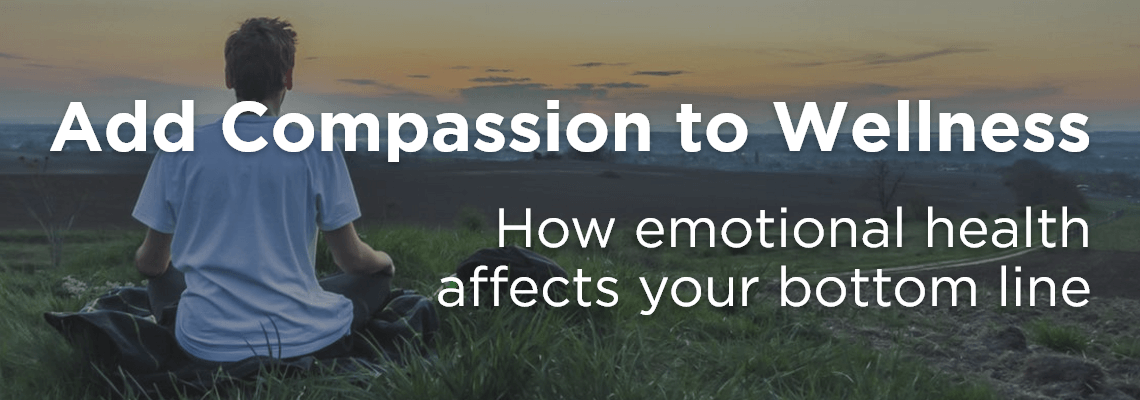We were so excited to have MJ Shaar come and speak with us at the 11th Annual Wellness Conference this past week. If you missed her talk, check out the post below for the helpful hints and highlights she provided, and make sure to register for next year’s conference!
We all know the health of our employees is directly linked to their productivity. We see it every day. The employee that’s consistently sick tends to underperform, while those that maintain active lifestyles always seem to be just a little bit ahead of the curve.
The question then becomes: “How do we keep our employees healthy?”
The first, and probably easiest, approach is to focus on our employees’ physical health. So we stock our fridge with fresh fruit, build a gym in the basement and attend community races.
But, talking about changing the way we eat and live is so much easier than actually making those changes — for ourselves and our employees. In order to see the most impact, we need to get to the motivations that determine why people act the way they do. And to do that, we need to understand their emotional health, as well.
The connection between emotional state and physical wellness has been well-documented over the past several years. The consensus being that our emotional state affects our willingness to make healthy choices and our chemical state, caused by those choices, affects our overall emotional health. It’s a never-ending cycle.
As managers, wellness experts and leaders, most of us do a good job of trying to motivate our employees to eat well and maintain a healthy lifestyle. But few of us understand how to truly make an impact on our employees’ mental health.
It’s really not a difficult concept. It all comes down to compassion.
Showing and receiving compassion has the power to change our health for a moment, a lifetime and, for some, a century.
Showing kindness to someone who you see drowning under piles of work, or having someone come ask how you’re doing on a day when you can’t seem to get your head above the water, changes our chemical makeup. In one moment, your endorphins go up, and your cortisol level drops. These are called micro-moments. They’re moments so small that you won’t remember them three days from now, but so powerful they’ll change your whole outlook on life.
Fostering Micro-moments
It’s easy to put ourselves in positions to experience these micro-moments in our personal lives, but less so at work. We tend to have support systems at home that just can’t be replicated in our offices. But that doesn’t mean it’s impossible. In fact, there are four ways you can foster an environment that creates these micro-moments.
- Find a Purpose
It’s all too easy to fall into a routine that takes the passion out of life. It’s too easy to wake up one day and wonder where the last five years went. If we go through life without finding a purpose, without realizing our passion, we become desensitized to the everyday things going on around us, and begin doing only what we need to in order to get to the next day.
- Create Community
Community is the one thing that keeps us motivated. It’s why when we join gyms, the trainers tell us to find an accountability partner. Our community keeps us grounded and engaged with the world around us. These are the people who stop by our offices just to make sure we’re doing okay. Creating communities at work isn’t easy, but it does create support systems that will help your employees in the long run.
- Find a Partner
Studies have shown that having a close friend at work increases your productivity sevenfold. Your friend is your accountability partner. They encourage you when you feel like there’s no way you’ll ever get your task list accomplished. They tell you when you need a break. They’re the one person you know will always be there for you.
- Prioritize
As a manager, it’s our job to prioritize our employees’ work. We have to make sure that we’re allowing time for them to unwind and relax between projects. As counterproductive as that sounds, when we push too many projects on them too quickly, they can and will become overwhelmed, stressed and unable to do their jobs.
The biggest struggle companies have is maintaining an environment like this — one that’s open, communicative and compassionate. The best advice is to get it in writing. Write it in your mission statement. Hang posters by your coffee machine or water cooler. From the very beginning, treat it like a routine. Eventually, maintaining this environment becomes second-nature to you and your employees.
It’s critical that you make compassion a habit. Not only will it elevate your employees’ moods, but it also has the potential to drastically affect their physical wellness. And when your employees are healthy, they become top performers. Can you afford to not be compassionate?


